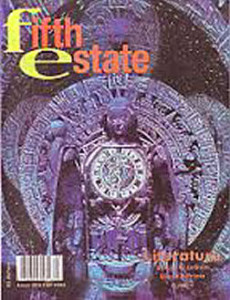Fifth Estate 373, Fall 2006 Add to the Bookbuilder

Various Authors
Letters to the Fifth Estate
In the Spring 2006 edition of FE, Fred from San Francisco wrote, “Congrats on changing anarchist to anti-authoritarian on your front page description,” and we asked, “Do readers have any thoughts about the change?” This issue, more readers responded, and so did we.
Recently, FE posed the question: Do readers have any thoughts about dropping anarchist from the masthead, and replacing it with anti-authoritarian?
Mar 12, 2015 Read the whole text...
Fifth Estate Collective
Contents, fund appeal
Every edition of Fifth Estate could be our last. This issue, originally scheduled for summer, did not hit the press until early September, thus making it our Fall 2006 edition; subscribers and distributors, please take note. Back in June, when this issue was due, our bank account was depleted, and our volunteers needed a break. But thanks to all the writers and artists who gave us material and to all the readers who answered our perennial plea for funds, we can publish another time. Without the contributions of art, prose, and cash, we would not exist.
Mar 12, 2015 Read the whole text...
Fifth Estate Collective
Call for Submissions, Winter 2006–2007
The winter issue of FE will critically reflect upon contemporary anarchist and radical anti-authoritarian political movements. What directions should radicals--who wish to both create a revolution in our everyday lives, as well as to destroy the various and overlapping systems of oppression--take in our current political situation? We welcome theoretical, historical and practical pieces on political and cultural issues.
Mar 13, 2015 Read the whole text...
Fifth Estate Collective
About this issue
When we set out to produce an issue on and of literature, we had wide eyes and wild ideas. Ideas like Thoreau suggested, “In literature it is only the wild that attracts us. Dullness is but another name for tameness.” Guided by these instructions, we set out searching for the same sense of “uncivilized free and wild thinking” that Thoreau found “in Hamlet and the Iliad, in all the scriptures and mythologies, not learned in the schools.” Rather than see books as stuffy culture, we would endorse Thoreau’s claim: “As the wild duck is more swift and beautiful than the tame, so is the wild-mallard-thought, which ‘mid falling dews wings its way above the fens. A truly good book is something as natural, and as unexpectedly and unaccountably fair and perfect, as a wild-flower discovered on the prairies of the West or in the jungles of the East. Genius is a light which makes the darkness visible, like the lightning’s flash, which perchance shatters the temple of knowledge itself ...”
Mar 12, 2015 Read the whole text...
anon.
Rogue Statism
Ragged Statelessness
“The man without a country is a free man. ‘Country’ is a tenfold chain forged around our necks and feet by our forefathers, a prison and a pit.”
--Herman Bang, Denied a Homeland (1906)
There is a traditional Arabic curse that translates into something like, “May their homes be demolished.” But, as a friend in Beirut said recently, one look at what happened in Israel’s war of destruction against Lebanon this summer is enough to make any decent human refrain from wishing that upon their worst enemy.
Mar 13, 2015 Read the whole text...
Fifth Estate Collective
More Reasons to Visit New Orleans
This issue of FE was finished on the first anniversary of Katrina. A year later, our friends in New Orleans still need our help. At the beginning of June, our comrade, regular contributor, friend, and Louisiana native John Clark wrote:
“It’s now exactly nine months since Hurricane Katrina. The past months have only reinforced the lessons that were learned in the first weeks after Katrina. The abject failure and utter irrationality of the dominant system of state and corporate power have only become more obvious with the passage of time. On the other hand, we have seen growing evidence of the extraordinary and inspiring achievements possible through mutual aid and solidarity.”
Mar 13, 2015 Read the whole text...
Fredy Perlman
The Continuing Appeal of Nationalism
Industrialized nations have procured their preliminary capital by expropriating, deporting, persecuting and segregating, if not always by exterminating, people designated as legitimate prey. Kinships were broken, environments were destroyed, cultural orientations and ways were extirpated.
Descendants of survivors of such onslaughts are lucky if they preserve the merest relics, the most fleeting shadows of their ancestors’ cultures. Many of the descendants do not retain even shadows; they are totally depleted; they go to work; they further enlarge the apparatus that destroyed their ancestors’ culture. And in the world of work they are relegated to the margins, to the most unpleasant and least highly paid jobs. This makes them mad. A supermarket packer, for example, may know more about the stocks and the ordering than the manager, may know that racism is the only reason he is not manager and the manager not a packer. A security guard may know racism is the only reason he’s not chief of police. It is among people who have lost all their roots, who dream themselves supermarket managers and chiefs of police, that the national liberation front takes root; this is where the leader and general staff are formed.
Mar 20, 2015 Read the whole text...
Emile Capouya
The Red Flag & the Black
FE staff note: Mike Ochs, a reader from Pennsylvania, sent us an obituary from The Nation for one of its former editors (1970–1976) Emile Capouya--saying “I thought of your efforts when I read it.” Remembering Capouya’s radical prose, Ted Solotaroff writes, “My favorite essay was ‘The Red Flag and the Black,’ a beautiful exposition of anarchism.... For all his dialectical agility and nuance, his black flag flew two simple principles that he had learned with his hands: People long to do better than they do, and they are naturally creative and cooperative. The categorical imperative of his politics was to act always in the spirit of the society we wish to bring about.”
Mar 20, 2015 Read the whole text...
Sherry Hendrick
Mick Vranich
Richard Mock’s Epic Vision

Richard Mock, political cartoonist, painter, sculptor, educator, anarchist, died in Brooklyn July 28 from complications due to diabetes at 61. Richard had an epic vision that he gave to us piece by piece in his creative linocuts. He freely contributed use of his political cartoons to anarchist and worker publications such as the Fifth Estate, Anarchy and UNITE. Many, such as the one on this page, graced our front covers.
Mar 20, 2015 Read the whole text...
MaxZine Weinstein
Rafael Mutis
Walls have never worked
Anarchist People of Color & the immigrant rights movement; an interview with Rafael Mutis
Rafael Mutis was part of the Brooklyn 7 arrested at an APOC (Anarchist People of Color) party raided by the police in 2003. They won and exposed the arrogant racist NYPD detectives. He currently works as an organizer against the Rockefeller drug laws, which are New York state’s version of the war on drugs. He is also active with the Escuela Popular Nortena. Rafael was interviewed by MaxZine Weinstein in May.
Mar 21, 2015 Read the whole text...
Unleash
There are ills the only cure for which is literature
Excerpt
I have hidden and covied poetic mead within the thickets of prose bramble-rambles, come and gather in the weeds. There is sweet berry-nectar to gather, a treasure hunt in the hedgelands for random bottles of elderberry wine. Feel free to stumble. Who knows what you might stumble upon? The poet’s job is to woo world, with words that are hymns. Rosebushes, stones, mountains need hymns. Deer and rats and ravens need hymns. Trees, beautiful dresses, beer need hymns. Little children and old grandmothers need hymns. God is in all this Godding; God is tickled at praise and glows in gentle pride. Wandering through world, the poet rambles and rants, like Whitman meandering through rhapsodic New York City. Whitman had Leaves of Grass. I think I might have Brambles of Berries. These are the brambles Brueghelian peasants ramble through on their way to the lusty groves where they commune with wind-gods, satyrs, fairies, and beer-gods! You may ask, are these prose-poems, rants, short dissertative vignettes? And I will love your question, but I will not answer.
Mar 22, 2015 Read the whole text...
Merril Mushroom
Darcee’s Temptation
Fiction
Darcee began to realize she was in serious trouble, that notions of rebellion were growing beyond her control, during the President’s speech. She and her co-workers were crowded together in the workplace auditorium for mandatory daily socialization, all eyes on the huge teevee screen, watching the image of Our Benevolent Leader, the President of GovCentral. He was flinging words to his public like great faux pearls that promised nothing beneath their shiny surfaces; yet the people were scooping them up through their ears and stringing them in memory to recall when they needed something to believe in.
Mar 22, 2015 Read the whole text...
Anu Bonobo
Octavia Estelle Butler
(June 22, 1947 — February 24, 2006)
When I learned of Octavia Butler’s death in late February 2006, I fought the feelings of loss. A longtime fan and student of her science fiction and fantasy, I never stopped sensing synchronicity and strangeness when I found that other radicals were reading her work. On the occasion of her passing, London’s Independent described her as “the central figure in the relatively close-knit community of black writers of the fantastic in America.”
Mar 22, 2015 Read the whole text...
Benjamin Carson
Planting the Seeds of Anarchy
Octavia Butler’s Parable of the Sower
In America, the last vestiges of the liberal social contract and public safety net have been virtually erased. Under George W. Bush, the gap between the rich and poor increases at an alarming rate while privatization pushes forward. While Social Security is being slowly eviscerated and replaced by Individual Retirement Accounts, wealthy people can survive growing old while leaving those who cannot to fend for themselves. At the same time, the “richest 1% of Americans,” who, according to Peter Singer, “hold more than 38 percent of the nation’s wealth,” are forming what David Harvey calls “ghettoes of affluence (their ‘bourgeois utopias’),” which undermine “concepts of citizenship, social belonging, and mutual support,” while the poor, who are being “pushed off welfare into a stagnant labor market,” are left to make their way in what, for so many, looks like a post-apocalyptic landscape.
Mar 28, 2015 Read the whole text...
Peter Lamborn Wilson
The Alchemy of Luddism
for Diane di Prima
St. John’s Eve (Midsummer) 2006
It’s the idea
of code that’s cool not the actual
bother of decipherment: the utopia
of not having been in a state of
anticipation or regret. The Dowager Empress
took fresh honeysuckle petals in her green tea — yes even Civilization had its finer moments
Mar 28, 2015 Read the whole text...
Diane DiPrima
Writings of Diane DiPrima

archangel of fire
enwraps now melts glaciers
turf unexposed
angelic aeons trembles
naked
under a vengeful sun
--Diane DiPrima
August 3, 2002
green shack in Richmond
tag on the door sez “Merlin’s”
just that
--Diane DiPrima
March 23, 2003
Train to Sacramento
true poppies:
Mar 28, 2015 Read the whole text...
Ursula K. Le Guin
Notes from the Inner City
Daughter of itinerants,
ungrateful refusers of benefits and charity,
in terror of the all-embracing arms
I turned from the tabernacles of turkey
and progeny of toothpaste, I ran and hid
from the love that damns and pardons,
I dodged the draft from the golden doors
and let the wild west wind carry me
with torn newspapers, cigarette butts, condoms,
up against the chainlink fence at the world’s ends
in a red November evening.
Mar 28, 2015 Read the whole text...
Elliott Liu
The Radical Roots of Gary Snyder
Looking at Gary Snyder’s writing is a geological experience. Picking up a copy of The Gary Snyder Reader or checking out his shelf at a library will reveal layers of poems, journals, and essays dating from the late fifties to the turn of the millennium--all written by a would-be Wobbly turned Zen poster child of the San Francisco Renaissance. Considered foundational texts for everything from the hippies and New Left to bioregionalism and Deep Ecology, Snyder’s work reads like a countercultural cross section of the last fifty years.
Mar 28, 2015 Read the whole text...
William Manson
Civilization as Dis-ease
“The friendly and flowing savage, who is he? Is he waiting for civilization, or is he past it and mastering it?”
-- Walt Whitman
Early in 1905, Leo Tolstoy wrote to a close friend in England: “Yesterday and today I have been reading Edward Carpenter’s book, Civilisation: Its Cause and Cure, and am enraptured by it.... Please inform me of what you know about Carpenter himself. I consider him a worthy successor to Carlyle and Ruskin.” The query as to Carpenter’s identity may well be repeated a hundred years later; his striking originality, which at one time inspired poets and anarchists alike, has since been virtually forgotten.
Mar 29, 2015 Read the whole text...
Roger Farr
Anarchist Poetics
“[The poet never] voices received opinions, or gives clear expression to the confused feelings of ‘the masses’: that is the function of the politician, the journalist, the demagogue.”
-- Herbert Read, “Art and Alienation”
“Poetry is the end(s) of politics.”
--L. Mirari, “The Politics of Refusal vs. the Refusal of Politics”
Mar 29, 2015 Read the whole text...
Sandor Ellix Katz
The End of Sexuality and Other Apocalyptic Scenarios
From The Revolution Will Not Be Microwaved, Chelsea Green, 2006
Can any action avert humanity’s technological downfall? I try to remain hopeful and cast my lot with the possibility of change, but our situation and prospects both appear rather bleak. So many nightmare scenarios have been imagined for us. Science fiction anticipated genetic tinkering generations before the technology existed to actually do it. The dangers I have just briefly described are very real. Yet I find that every new revelation seems strangely familiar, as if we had been expecting it. Each sensational news report seems like it must have come from science fiction.
Apr 1, 2015 Read the whole text...
Various Authors
Books that changed our lives
When we put out the calls for this issue, we sought lists and commentaries on books that changed people’s lives. Apparently, many were too busy with summer reading to respond. Others may be too busy with life to read--or to write about what they might be reading if they’re reading. For me, I’ve decided to name writers more than books, and the shortlist is rather long, heavily populated by poets. Allen Ginsberg’s influence on me might always overshadow other writers, and to learn more about that, please see my article on him in a few pages. My world view has been so widely shaped by all of these visionaries that I would feel remiss not giving them their due in this issue.
Apr 1, 2015 Read the whole text...
Cara Hoffman
Here Comes Success
Fiction
Just before 1998, he started taking advice from the talking crow.
It started like you might have imagined. The crow was perched on a spindly branch near the hospital parking lot. It quietly assessed him.
He was getting his car keys out of his pocket, and the crow was drawn in by his smooth knuckles as they slid into the denim of his jeans and then slid out barely concealing something shiny.
Apr 1, 2015 Read the whole text...
Anu Bonobo
A Revolution without Enemies
Allen Ginsberg & the Poetics of Psychedelic Anarchism
An experimental rant titled “Radical Poetry, Heretical Religion, and the Psychedelic Revolution” provided the germ and genesis for this rambling, review-essay.
I delivered that sermon in my over-the-top Reverend Bonobo mode for a gathering in western North Carolina called “Croatan.” Held in late April 2006, the event featured lectures by the likes of scientist and scholar of mind-altering substances Dennis McKenna (brother of the late Terence McKenna), late nights of electronic dance music, and thunderous spring rains that sprayed us all with epic torrents.
Apr 1, 2015 Read the whole text...
Various Authors
The Amish, “Obnoxious Machinery” & Community
an exchange
In response to “Secular Antinomian Anabaptist Neo-Luddism,” FE #372, Spring, 2006]
Dear Fifth Estate,
When I saw the cover of FE which promised an article on the Amish and Anarchists, it piqued my interest. I live in Amish country, Pennsylvania. An Old Order Amish family are my next door neighbors.
Apr 4, 2015 Read the whole text...
Walker Lane (Peter Werbe)
The State and Longing for Arcadia
Review
reviewed here:
The State, Harold Barclay, Freedom Press, London, 2003, 109 pp.
Longing for Arcadia: Memoirs of an AnarchoCynicalist Anthropologist, Harold B. Barclay, Trafford, 2005, Victoria, BC, 362 pp.
Harold Barclay’s thin volume on the political state packs into its pages everything we need to know to realize that there is nothing eternal about this inherently oppressive institution. A relatively recent phenomenon in human affairs, Barclay traces its origins to a few thousand years ago based on the desire of a few men to control others by establishing hierarchical societies in place of the egalitarian ones that preceded them.
Apr 4, 2015 Read the whole text...
Walker Lane (Peter Werbe)
Anne R. Key
Reviews
The Wedding and Other Stories and Oystercatcher #3
The Wedding and Other Stories, Cara Hoffman, Factory School Southpaw Culture, 2006, 114 pp., factoryschool.org. Available from the Barn
Cara Hoffman’s seven tautly written, alternately ominous and humorous short stories are driven by her elegant use of language. She’s a writer in the now unfashionable old school where words and the images they create shape story and characters rather than breathless action scenarios waiting to be transferred from page to film. There’s great craft here where one can almost feel the work put into each sinuous sentence; sometimes each word.
Apr 8, 2015 Read the whole text...
Fifth Estate Collective
Books
Our friends at Black and Red Books--another radical publishing project from Detroit--have finally put their catalog online at http://blackandred.org. It’s now easier than ever to find titles like Society of the Spectacle; Against His-story, Against Leviathan; The Strait; The Continuing Appeal of Nationalism; Love and Politics; The Wandering of Humanity, and more.
Apr 8, 2015 Read the whole text...
James Koehnline
Back cover

Don’t say you can’t turn back the clock—you do it every year, dupe of daylight savings time—as if you could add or subtract one hour from light by bureaucratic fiat. The really progressive position is reversion.
—Peter Lamborn Wilson “The Alchemy of Luddism”
Graphic: James Koehnline http://www.koehnline.com/
Apr 8, 2015 Read the whole text...
